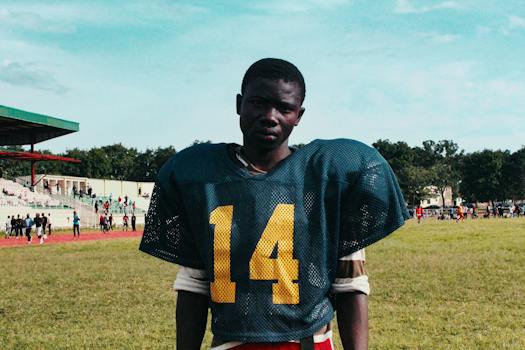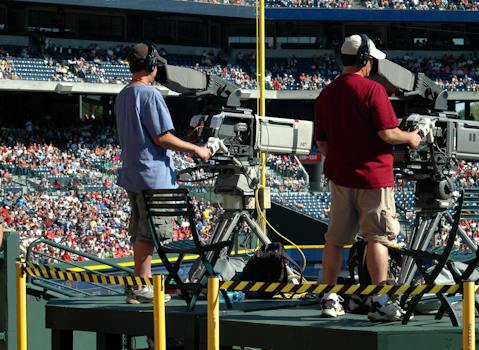

-
Table of Contents
"The Erosion of Respect: Unveiling the Dark Side of American Sports Fandom."
Introduction
The erosion of respect in American sports fandom refers to the decline in the level of respect and sportsmanship displayed by fans towards opposing teams, players, and even their own team. This phenomenon has become increasingly prevalent in recent years, with incidents of verbal abuse, physical altercations, and online harassment becoming more common. This erosion of respect not only tarnishes the reputation of sports fandom but also has negative consequences for the overall enjoyment and spirit of the game.
The Impact of Social Media on Sports Fandom Respect
The Erosion of Respect in American Sports Fandom
Sports fandom has long been a cherished aspect of American culture, with fans passionately supporting their favorite teams and players. However, in recent years, there has been a noticeable erosion of respect within the realm of sports fandom. This decline can largely be attributed to the rise of social media and its impact on the way fans interact with each other and with athletes.
One of the main factors contributing to the erosion of respect in sports fandom is the anonymity provided by social media platforms. In the past, fans would express their opinions and frustrations in the confines of their living rooms or at the stadium. Now, with the advent of social media, anyone can voice their thoughts and feelings to a wide audience without revealing their true identity. This anonymity often leads to a lack of accountability for one's words and actions, resulting in disrespectful behavior towards athletes and fellow fans.
Furthermore, the immediacy of social media allows for instant reactions to sporting events. Fans can now share their thoughts and emotions in real-time, often without taking a moment to reflect on the impact of their words. This instant gratification can lead to impulsive and disrespectful comments, as fans seek to vent their frustrations or celebrate their team's success without considering the consequences of their actions.
Another aspect of social media that has contributed to the erosion of respect in sports fandom is the creation of echo chambers. Online communities and fan groups often attract like-minded individuals who reinforce each other's beliefs and opinions. While this can create a sense of camaraderie, it also fosters an "us versus them" mentality, where fans become more focused on defending their team or player rather than engaging in respectful dialogue with fans of opposing teams. This tribalistic mindset further perpetuates disrespectful behavior, as fans feel justified in attacking those who do not share their views.
Additionally, social media has given rise to a phenomenon known as "keyboard warriors." These individuals hide behind their screens, using their online presence to launch personal attacks on athletes and fellow fans. The detachment provided by the digital world allows these individuals to say things they would never dare to say in person, further contributing to the erosion of respect in sports fandom.
The impact of this erosion of respect is not limited to the online world. Athletes, who were once seen as heroes and role models, are now subjected to constant scrutiny and criticism. This lack of respect can have a detrimental effect on their mental health and overall well-being. It can also create a toxic environment for fans, as the focus shifts from enjoying the game to engaging in heated arguments and personal attacks.
In conclusion, the erosion of respect in American sports fandom can largely be attributed to the rise of social media. The anonymity, immediacy, and echo chambers provided by these platforms have created an environment where disrespectful behavior thrives. It is crucial for fans to recognize the impact of their words and actions and strive to restore respect within the realm of sports fandom. By fostering a culture of accountability, reflection, and open dialogue, we can ensure that sports fandom remains a positive and enjoyable experience for all.
The Role of Athlete Behavior in Shaping Fan Respect

The Role of Athlete Behavior in Shaping Fan Respect
In the world of sports, athletes are not only admired for their physical abilities but also for their behavior on and off the field. Athletes serve as role models for many fans, especially young ones, who look up to them and aspire to be like them. However, in recent years, there has been a noticeable erosion of respect in American sports fandom, and athlete behavior plays a significant role in shaping this trend.
One of the primary reasons for the erosion of respect is the increasing number of incidents involving athletes engaging in inappropriate behavior. Whether it is domestic violence, substance abuse, or even cheating, these actions tarnish the image of athletes and make it difficult for fans to respect them. When fans see their favorite athletes involved in such misconduct, it becomes challenging to separate their on-field performance from their off-field actions.
Moreover, the rise of social media has made it easier for fans to witness and share these incidents, amplifying their impact. In the past, news of an athlete's misbehavior might have been limited to a small circle of fans or local media. However, with the advent of platforms like Twitter and Instagram, these incidents quickly go viral, reaching a much larger audience. As a result, fans are exposed to a constant stream of negative news about athletes, further eroding their respect for them.
Another factor contributing to the erosion of respect is the lack of accountability for athlete behavior. In some cases, athletes who engage in inappropriate actions receive minimal consequences, if any at all. This sends a message to fans that their behavior is not taken seriously and that they can get away with misconduct. When fans see athletes escaping punishment for their actions, it undermines their faith in the integrity of the sport and diminishes their respect for the athletes involved.
Furthermore, the commercialization of sports has also played a role in shaping fan respect. Athletes are now seen as commodities, with their marketability often prioritized over their behavior. This focus on profit can lead to a disregard for the values and principles that should be upheld in sports. When fans witness athletes being rewarded financially despite their questionable behavior, it sends a message that winning and making money are more important than integrity and respect.
However, it is important to note that not all athletes contribute to the erosion of respect. Many athletes conduct themselves with dignity and serve as positive role models for fans. These athletes understand the influence they have on their fans and strive to set a good example both on and off the field. Their behavior reinforces the values of sportsmanship, fair play, and respect, and helps counteract the negative impact of those who engage in misconduct.
In conclusion, athlete behavior plays a significant role in shaping fan respect in American sports fandom. The increasing number of incidents involving athletes engaging in inappropriate behavior, the amplification of these incidents through social media, the lack of accountability for athlete behavior, and the commercialization of sports all contribute to the erosion of respect. However, it is crucial to recognize and celebrate the athletes who continue to uphold the values of sportsmanship and serve as positive role models for fans. By highlighting their behavior, we can inspire a new generation of athletes and fans who prioritize respect and integrity in sports.
The Influence of Fan Rivalries on Respect in American Sports
The Influence of Fan Rivalries on Respect in American Sports
Sports fandom in America is a phenomenon that has grown exponentially over the years. Fans are passionate about their teams, and this passion often leads to intense rivalries between different fan bases. While rivalries can add excitement and intensity to the sporting experience, they can also contribute to the erosion of respect among fans.
One of the main reasons why fan rivalries can lead to a lack of respect is the tendency for fans to engage in trash talk. Trash talk is a form of banter between fans of opposing teams, where insults and derogatory comments are exchanged. While it may seem harmless on the surface, trash talk can quickly escalate and become personal, crossing the line from friendly banter to outright disrespect. This disrespect can spill over into other aspects of life, as fans may carry their animosity towards rival teams into their interactions with fans in other contexts.
Another factor that contributes to the erosion of respect in American sports fandom is the prevalence of online platforms and social media. With the rise of the internet and social media, fans now have a platform to express their opinions and engage with others in real-time. While this can be a positive development, it also opens the door for disrespectful behavior. Fans can hide behind the anonymity of the internet and say things they would never say in person. This lack of accountability can lead to a toxic online environment where insults and personal attacks are the norm.
Furthermore, the media plays a significant role in fueling fan rivalries and perpetuating disrespect. Sports media outlets often focus on the drama and conflict between teams and their fans, as it generates more interest and viewership. This constant coverage of rivalries and the negative aspects of fan behavior can create a perception that disrespect is an inherent part of sports fandom. This, in turn, can influence fans to adopt a disrespectful attitude towards rival teams and their fans.
The erosion of respect in American sports fandom is not only detrimental to the overall fan experience but also to the athletes themselves. Athletes put in countless hours of hard work and dedication to their craft, and they deserve to be treated with respect. When fans engage in disrespectful behavior, it can have a negative impact on the mental well-being of athletes. It can also discourage young athletes from pursuing their dreams, as they may fear the potential backlash from fans.
To address the erosion of respect in American sports fandom, it is crucial for fans to recognize the importance of respectful behavior. While rivalries can be exciting, it is essential to remember that at the end of the day, sports are just games. Engaging in respectful banter and friendly competition can enhance the sporting experience for everyone involved. Additionally, sports organizations and media outlets should take responsibility for promoting a culture of respect among fans. By highlighting positive fan interactions and discouraging disrespectful behavior, they can help create a more inclusive and respectful sports environment.
In conclusion, fan rivalries have a significant influence on the erosion of respect in American sports fandom. Trash talk, online platforms, and media coverage all contribute to the lack of respect among fans. It is crucial for fans, sports organizations, and media outlets to recognize the importance of respectful behavior and work towards creating a more inclusive and respectful sports culture. By doing so, we can ensure that sports fandom remains a positive and enjoyable experience for all.
Q&A
1. What factors have contributed to the erosion of respect in American sports fandom?
There are several factors that have contributed to the erosion of respect in American sports fandom, including increased competitiveness, the influence of social media, and the behavior of athletes and fans.
2. How has increased competitiveness affected respect in American sports fandom?
Increased competitiveness has led to a more intense and cutthroat environment in sports, where winning becomes the sole focus. This has resulted in fans and athletes disrespecting opponents, officials, and even their own teammates.
3. What role does social media play in the erosion of respect in American sports fandom?
Social media has provided a platform for fans to express their opinions and engage with athletes directly. However, it has also facilitated the spread of negativity, cyberbullying, and disrespectful behavior, which can further erode respect in sports fandom.
Conclusion
In conclusion, the erosion of respect in American sports fandom is a concerning trend. The increasing incidents of disrespectful behavior, such as verbal abuse, physical altercations, and online harassment, have tarnished the once-positive image of sports fans. This decline in respect not only affects the overall experience of attending or watching sports events but also has a negative impact on the athletes, coaches, and the sports community as a whole. It is crucial for fans, sports organizations, and society at large to address this issue and promote a culture of respect and sportsmanship in American sports fandom.










